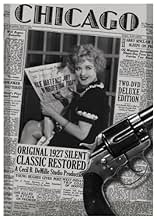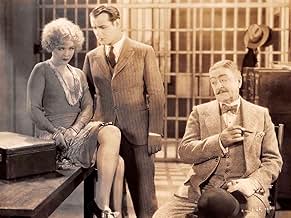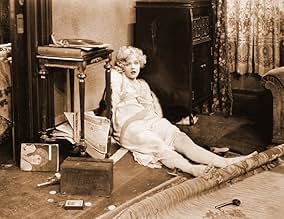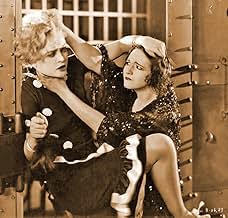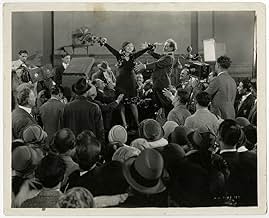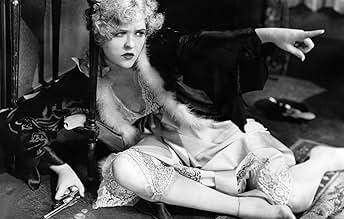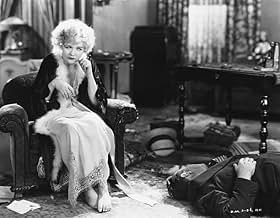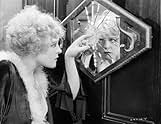Ajouter une intrigue dans votre langueA wild jazz-loving and boozing wife Roxie Hart kills her boyfriend in cold blood after he leaves her.A wild jazz-loving and boozing wife Roxie Hart kills her boyfriend in cold blood after he leaves her.A wild jazz-loving and boozing wife Roxie Hart kills her boyfriend in cold blood after he leaves her.
- Réalisation
- Scénario
- Casting principal
- Récompenses
- 2 victoires au total
Emily Barrye
- Woman in Cell Reading Book
- (non crédité)
Sidney Bracey
- Bill Collector
- (non crédité)
Robert Brower
- Juror
- (non crédité)
Sidney D'Albrook
- Photographer
- (non crédité)
Jack Dean
- Assistant Prosecutor
- (non crédité)
Robert Dudley
- Insurance Agent
- (non crédité)
Jim Farley
- Detective
- (non crédité)
Avis à la une
10CJBx7
CHICAGO (1927) is the story of Roxie Hart (Phyllis Haver), a bored young housewife who kills her lover during an argument. She convinces her doting husband Amos (Victor Varconi) that she killed the man in self- defense. Amos goes to great lengths to save her from the noose, hiring oily lawyer William Flynn (Robert Edeson). Meanwhile, a slick reporter (T Roy Barnes) plays up her beauty and "innocence", making her into a nationwide celebrity. Direction is credited to Frank Urson, but in actuality Cecil B DeMille directed the majority of the film.
CHICAGO is an adaptation of a play by author Maurine Watkins, which was inspired by Watkins' own articles about the trial of real-life murderess Beulah Annan. The film is tight and well crafted. In particular, it's a sharp and merciless satire on unearned celebrity, societal double standards, and the hedonistic 1920s lifestyle. There are many laugh-out- loud hilarious scenes, including a scene where Flynn coaches Roxie on how to appear during his closing statement to the jury, and a scene of the photographer posing Roxie shortly after the murder takes place. Many scenes use exaggeration to make points about media sensationalism and lawyers' appeals to emotion, rather than truth, in order to exonerate their guilty clients. The humor is balanced by the dramatic portrayal of Amos' efforts to save his undeserving wife from the noose. Amos is the moral center of the movie, a decent man who is so in love with his wife that he is willing to break the law to save her, yet struggles with her murderous deed and self-centered, callous attitude.
The acting in CHICAGO is nothing less than excellent. Phyllis Haver makes a great lead, portraying the many facets of Roxie Hart's character skillfully. She shows equal comedic and dramatic ability. One could argue that Roxie is a sociopath, able to turn on the charm and the waterworks at will in order to get her way, but fundamentally lacking a conscience. Haver's portrayal of Roxie is perfect. I had never heard of Victor Varconi before, but he played Amos with great skill, sensitivity and restraint, turning in a very believable performance. The rest of the cast does fine work as well.
Visually, CHICAGO is top-notch, with skillful editing, fluid camera work, and meaningful use of visual cues. One instance of this is a shot of a crowd walking heedlessly on a newspaper with Roxie on the front page once her 15 minutes of fame are up. The visual style of the film points the way forward to the classic Hollywood style of the 1930s and 40s. This film came out the same year as landmark movies like SUNRISE, WINGS, and METROPOLIS, and even though it is not as celebrated as those visual marvels, in its way it's just as accomplished.
SUMMARY: CHICAGO is a skillful blend of satire and drama that boasts a razor-sharp script, excellent performances, and highly accomplished direction. The message of the movie has just as much resonance now as it did in its time. A classic! SCORE: 10/10.
CHICAGO is an adaptation of a play by author Maurine Watkins, which was inspired by Watkins' own articles about the trial of real-life murderess Beulah Annan. The film is tight and well crafted. In particular, it's a sharp and merciless satire on unearned celebrity, societal double standards, and the hedonistic 1920s lifestyle. There are many laugh-out- loud hilarious scenes, including a scene where Flynn coaches Roxie on how to appear during his closing statement to the jury, and a scene of the photographer posing Roxie shortly after the murder takes place. Many scenes use exaggeration to make points about media sensationalism and lawyers' appeals to emotion, rather than truth, in order to exonerate their guilty clients. The humor is balanced by the dramatic portrayal of Amos' efforts to save his undeserving wife from the noose. Amos is the moral center of the movie, a decent man who is so in love with his wife that he is willing to break the law to save her, yet struggles with her murderous deed and self-centered, callous attitude.
The acting in CHICAGO is nothing less than excellent. Phyllis Haver makes a great lead, portraying the many facets of Roxie Hart's character skillfully. She shows equal comedic and dramatic ability. One could argue that Roxie is a sociopath, able to turn on the charm and the waterworks at will in order to get her way, but fundamentally lacking a conscience. Haver's portrayal of Roxie is perfect. I had never heard of Victor Varconi before, but he played Amos with great skill, sensitivity and restraint, turning in a very believable performance. The rest of the cast does fine work as well.
Visually, CHICAGO is top-notch, with skillful editing, fluid camera work, and meaningful use of visual cues. One instance of this is a shot of a crowd walking heedlessly on a newspaper with Roxie on the front page once her 15 minutes of fame are up. The visual style of the film points the way forward to the classic Hollywood style of the 1930s and 40s. This film came out the same year as landmark movies like SUNRISE, WINGS, and METROPOLIS, and even though it is not as celebrated as those visual marvels, in its way it's just as accomplished.
SUMMARY: CHICAGO is a skillful blend of satire and drama that boasts a razor-sharp script, excellent performances, and highly accomplished direction. The message of the movie has just as much resonance now as it did in its time. A classic! SCORE: 10/10.
Phyllis Haver plays the sexy but fickle and material-minded wife of shopworker Victor Varconi, who seems a nice but dullish fellow. While at he's at work, Haver invites 'sugar-daddy' Eugene Pallette upstairs, not realizing that he is intending to dump her, owing to her extravagance. When Pallette refuses to cough up anymore cash, she shoots and kills him, leading to a spectacular and amusing trial.
Along the way, we have a wonderful prison scene with inmates being presided over by matron May Robson, a vindictive D. A. splendidly played by Warner Richmond, and a crooked lawyer in the form of Robert Edeson. Further amusement is provided when Varconi has scraped up $2,500 (rather a lot for a chap who works in a tobacco shop) for the defense and has to cough up the same again. He then decides to rob the fellow to get the remainder, finding it is in fact crooked money as well, having been delivered by thug Walter Long in an all-too-brief cameo, before the climactic trial. Oh, and the nice, pretty cleaning lady (Virginia Bradford) has a yen for Varconi...
The direction of CHICAGO is credited to Frank Urson, who was unknown to me, possibly due to his career being cut short by his death the following year. Other notable credits are Peverell Marley, Mitchell Leisen and Leonore Coffee, and the whole thing is very handsomely presented, with a nice score from Rodney Sauer.
Along the way, we have a wonderful prison scene with inmates being presided over by matron May Robson, a vindictive D. A. splendidly played by Warner Richmond, and a crooked lawyer in the form of Robert Edeson. Further amusement is provided when Varconi has scraped up $2,500 (rather a lot for a chap who works in a tobacco shop) for the defense and has to cough up the same again. He then decides to rob the fellow to get the remainder, finding it is in fact crooked money as well, having been delivered by thug Walter Long in an all-too-brief cameo, before the climactic trial. Oh, and the nice, pretty cleaning lady (Virginia Bradford) has a yen for Varconi...
The direction of CHICAGO is credited to Frank Urson, who was unknown to me, possibly due to his career being cut short by his death the following year. Other notable credits are Peverell Marley, Mitchell Leisen and Leonore Coffee, and the whole thing is very handsomely presented, with a nice score from Rodney Sauer.
Phyllis Haver stars here as Roxie Hart in a story based on a hit Broadway play from 1927. Just about everyone is familiar with the story. Roxie plugs her lover and tries to pin it on her sap of a husband Amos. But while in jail she becomes a tabloid queen, especially after lawyer Billy Flynn enters the picture. He's an expert on law and headlines, especially after he gets his $5,000.
Haver, who looks a lot like Laura La Plante here) is terrific as the hard-boiled Roxie as she learns the ropes in prison and in the court room. Haver never misses a comic or ironic beat. Victor Varconi plays the hapless Amos, but he has a whole subplot here that's not in the famous musical versions of this play. Billy is played by Robert Edeson, the matron is played by May Robson, and Casley is played by Eugene Palette. There is no Velma Kelly in this story but Roxie's rival in prison, who is unnamed, is played by Julia Faye.
The film was produced by Cecil B. DeMille and although Frank Urson gets credit for direction, many think the film was directed by DeMille.
This new DVD release by Flicker Alley is a gorgeous print with solid music by the Mont Alto Orchestra. The sound effects are amusing.
Haver, who looks a lot like Laura La Plante here) is terrific as the hard-boiled Roxie as she learns the ropes in prison and in the court room. Haver never misses a comic or ironic beat. Victor Varconi plays the hapless Amos, but he has a whole subplot here that's not in the famous musical versions of this play. Billy is played by Robert Edeson, the matron is played by May Robson, and Casley is played by Eugene Palette. There is no Velma Kelly in this story but Roxie's rival in prison, who is unnamed, is played by Julia Faye.
The film was produced by Cecil B. DeMille and although Frank Urson gets credit for direction, many think the film was directed by DeMille.
This new DVD release by Flicker Alley is a gorgeous print with solid music by the Mont Alto Orchestra. The sound effects are amusing.
I read the Maureen Watkins play after seeing "Chicago" (2002) and "Roxie Hart" (1941). I was definitely looking forward to seeing this long lost 1927 version. While, I did enjoy many things, there were also some disappointments.
The good things are the little comic bits that are added which the play and other two movies do not have. These include Roxie putting black stockings on her door to pretend that someone inside has died to trick a repo-man and putting her husband's tie around her neck to show what the hangman's noose will look like. The rehearsal of her "looks" before the jury is hilarious, so are the three gum chewing young women spellbound by the trial as if watching a movie. These little bits really brighten the movie.
Unfortunately, probably because conservative, religious nut Cecil B. DeMille was the producer, the sharp satire of the play and the two other movies is sharply curtailed. What we get instead is a quite melodramatic subplot which takes up almost one quarter of the film. It involves the husband and his stealing money from the lawyer Flynn and his relationship with a housekeeper. This subplot is dull and undercuts the sense of sexiness and gallows humor that the play and the other movies thrive on.
While a good film and certainly worth seeing, it doesn't match the greatness of the later films or earlier play. The DVD does have some nice extras, including a well done documentary short looking at the real trial, Maureen Watkins original newspaper articles, a 1950 documentary on the 1920's and "The Flapper Story" a delightful 1985 documentary.
The good things are the little comic bits that are added which the play and other two movies do not have. These include Roxie putting black stockings on her door to pretend that someone inside has died to trick a repo-man and putting her husband's tie around her neck to show what the hangman's noose will look like. The rehearsal of her "looks" before the jury is hilarious, so are the three gum chewing young women spellbound by the trial as if watching a movie. These little bits really brighten the movie.
Unfortunately, probably because conservative, religious nut Cecil B. DeMille was the producer, the sharp satire of the play and the two other movies is sharply curtailed. What we get instead is a quite melodramatic subplot which takes up almost one quarter of the film. It involves the husband and his stealing money from the lawyer Flynn and his relationship with a housekeeper. This subplot is dull and undercuts the sense of sexiness and gallows humor that the play and the other movies thrive on.
While a good film and certainly worth seeing, it doesn't match the greatness of the later films or earlier play. The DVD does have some nice extras, including a well done documentary short looking at the real trial, Maureen Watkins original newspaper articles, a 1950 documentary on the 1920's and "The Flapper Story" a delightful 1985 documentary.
Chicago in the mid 20's of the last century.
In this modern Amerikan city reside the Hart's, a young married couple, who adapt to the spirit of the big city. Herr Amos Hart works in a tobacco store and Frau Roxie Hart does absolute nothing but to be unfaithful to her husband with an old man. The old-timer accommodates her whims although this is coming nearly to an end. So when Frau Roxie hears this news; she, who is a bad, bad girl ( besides a peroxide blonde with no brains ... excuse this Herr Graf for such obvious remark ) kills her lover in her apartment.
Desperate over what she has done, she calls for help to her husband telling him that the old man tried to get advantage of her. Herr Hart who is a good man but not stupid at all, discovers what really happened in there. But his love for Roxie is so important to him that he decides to help her by taking the services of a famous, greedy and unscrupulous advocate ( excuse again this Herr Graf for such an obvious remark ); this in order to defend his wife from the death penalty. However, such favour has an expensive price – 5.000 grand that obviously Herr Hart doesn't have.
During a visit to his greedy advocate, he finds out where he hides a lot of money in his bureau and during the night steals the money ( an honourable deed indeed, to rob an advocate ). Meanwhile Frau Roxie Hart's famous trial is nearly begun.
"Chicago", a film directed by Herr Frank Urson in the silent year of 1927, was based in a Broadway play which in turn was based on a true story ( occurring in a real city! ). Reminiscences of the original stage play in its primal concept can be seen in the film, when the director uses a few sets ( the Hart's apartment, the jail or the trial court ) in order to develop the story as it were different acts of a play. This is especially during the first part of the film during the dramatic development at the Hart's apartment and at the end of the movie during the trial. However, Herr Urson makes fairly good use of the proper characteristics of the cinema film narrative in "Chicago" by, constructing excellent visual metaphors ( the jury's feet responding Frau Roxie charms, the tabloid paper going down the gutter ). There are also important and sibylline sexual remarks that are present during the whole film (ah, that garter bell belt). And let's not forget the social realism that can be seen in the film ( Chicago daily life or the Hart's apartment ). Especially outstanding is the power of the yellow press in those old days ( and unfortunately in these modern days too ); the sensationalist journals build up stories on innocent celebrities that certainly have few merits. Naturally this happened with the madcap Roxie, a situation depicted in "Chicago" in a raw and effective way.
Another merit of "Chicago" is the combination of comedy and drama in equal terms highlighting Frau Roxie's stupidity, selfishness and easy living in contrast with her self-sacrificing husband who suffers the acts and nonsense of his wife. He's a man who honestly cares about and loves his wife enough to steal and lie for her although this affection and emotion is not returned.
Starring as the couple are two excellent and not well-known actors who handle their roles considerably well. Herr Victor Varconi as Herr Amos Hart is the lovingly and humiliated husband. Frau Phyllis Haver shines and takes all the credit in the picture thanks to her brilliant performance as Roxie Hart, a madcap, simple and selfish modern girl who has no scruples combined with no brains ... who will have a moment of glory as a famous killer thanks to the help of the yellow press ... who will meet her end on the end of a rope a woman who lives her own life caring for no one except the money.
"Chicago" is an excellent silent movie for all those reasons mentioned above by this German count. Don't forget also a modern one added recently featuring a superb musical score compiled by Herr Rodney Sauer and "The Mont Alto Motion Picture Orchestra". They capture the spirit and mood of the roaring twenties of the last century.
And now, if you'll allow me, I must temporarily take my leave because this German Count must to return to the Schloss from the Windy City.
Herr Graf Ferdinand Von Galitzien http://ferdinandvongalitzien.blogspot.com
In this modern Amerikan city reside the Hart's, a young married couple, who adapt to the spirit of the big city. Herr Amos Hart works in a tobacco store and Frau Roxie Hart does absolute nothing but to be unfaithful to her husband with an old man. The old-timer accommodates her whims although this is coming nearly to an end. So when Frau Roxie hears this news; she, who is a bad, bad girl ( besides a peroxide blonde with no brains ... excuse this Herr Graf for such obvious remark ) kills her lover in her apartment.
Desperate over what she has done, she calls for help to her husband telling him that the old man tried to get advantage of her. Herr Hart who is a good man but not stupid at all, discovers what really happened in there. But his love for Roxie is so important to him that he decides to help her by taking the services of a famous, greedy and unscrupulous advocate ( excuse again this Herr Graf for such an obvious remark ); this in order to defend his wife from the death penalty. However, such favour has an expensive price – 5.000 grand that obviously Herr Hart doesn't have.
During a visit to his greedy advocate, he finds out where he hides a lot of money in his bureau and during the night steals the money ( an honourable deed indeed, to rob an advocate ). Meanwhile Frau Roxie Hart's famous trial is nearly begun.
"Chicago", a film directed by Herr Frank Urson in the silent year of 1927, was based in a Broadway play which in turn was based on a true story ( occurring in a real city! ). Reminiscences of the original stage play in its primal concept can be seen in the film, when the director uses a few sets ( the Hart's apartment, the jail or the trial court ) in order to develop the story as it were different acts of a play. This is especially during the first part of the film during the dramatic development at the Hart's apartment and at the end of the movie during the trial. However, Herr Urson makes fairly good use of the proper characteristics of the cinema film narrative in "Chicago" by, constructing excellent visual metaphors ( the jury's feet responding Frau Roxie charms, the tabloid paper going down the gutter ). There are also important and sibylline sexual remarks that are present during the whole film (ah, that garter bell belt). And let's not forget the social realism that can be seen in the film ( Chicago daily life or the Hart's apartment ). Especially outstanding is the power of the yellow press in those old days ( and unfortunately in these modern days too ); the sensationalist journals build up stories on innocent celebrities that certainly have few merits. Naturally this happened with the madcap Roxie, a situation depicted in "Chicago" in a raw and effective way.
Another merit of "Chicago" is the combination of comedy and drama in equal terms highlighting Frau Roxie's stupidity, selfishness and easy living in contrast with her self-sacrificing husband who suffers the acts and nonsense of his wife. He's a man who honestly cares about and loves his wife enough to steal and lie for her although this affection and emotion is not returned.
Starring as the couple are two excellent and not well-known actors who handle their roles considerably well. Herr Victor Varconi as Herr Amos Hart is the lovingly and humiliated husband. Frau Phyllis Haver shines and takes all the credit in the picture thanks to her brilliant performance as Roxie Hart, a madcap, simple and selfish modern girl who has no scruples combined with no brains ... who will have a moment of glory as a famous killer thanks to the help of the yellow press ... who will meet her end on the end of a rope a woman who lives her own life caring for no one except the money.
"Chicago" is an excellent silent movie for all those reasons mentioned above by this German count. Don't forget also a modern one added recently featuring a superb musical score compiled by Herr Rodney Sauer and "The Mont Alto Motion Picture Orchestra". They capture the spirit and mood of the roaring twenties of the last century.
And now, if you'll allow me, I must temporarily take my leave because this German Count must to return to the Schloss from the Windy City.
Herr Graf Ferdinand Von Galitzien http://ferdinandvongalitzien.blogspot.com
Le saviez-vous
- AnecdotesAlthough Frank Urson is credited as the director, it was widely known (and even publicized) at the time that producer Cecil B. DeMille directed most of the film (including 11 days of re-takes). DeMille took his name off the picture because his Biblical epic, Le Roi des rois (1927) was also playing in theaters at the time. Reportedly, DeMille's friend, theater owner Sid Grauman, convinced the director that audiences wouldn't want to see an amoral crime drama with an adulterous heroine so soon after seeing DeMille's film about the life of Christ.
- Citations
William Flynn: Cut the bull! I'm not your husband - I'm your lawyer!
- ConnexionsFeatured in The 79th Annual Academy Awards (2007)
Meilleurs choix
Connectez-vous pour évaluer et suivre la liste de favoris afin de recevoir des recommandations personnalisées
- How long is Chicago?Alimenté par Alexa
Détails
Box-office
- Budget
- 264 397 $US (estimé)
- Durée
- 1h 45min(105 min)
- Mixage
- Rapport de forme
- 1.33 : 1
Contribuer à cette page
Suggérer une modification ou ajouter du contenu manquant

